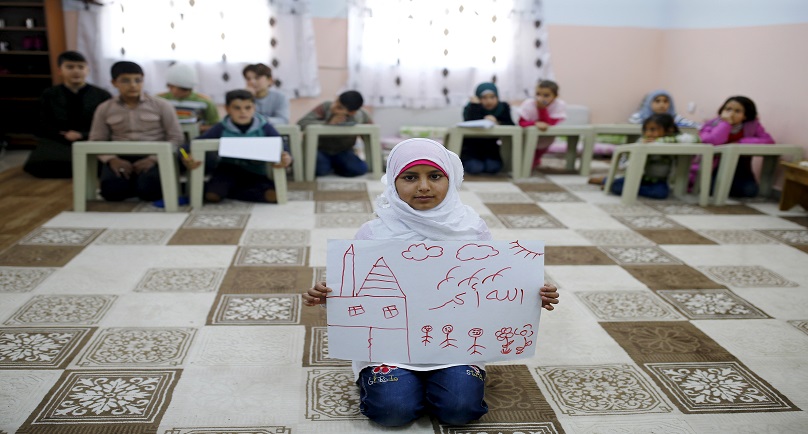Image: Syrian refugee Islem Halife, 11, shows a drawing of her home in Syria, as she sits in a classroom where she learns the Quran in Nizip refugee camp in Gaziantep province, Turkey, December 13, 2015. REUTERS/Umit Bektas
By Umit Bektas
YAYLADAGI, Turkey (Reuters) – When nine-year old Ilaf Hassun drew a picture of her home she scrawled a simple house, trees and clouds with smiling faces. Then in thick red pen, she added the figure of a woman clutching her dead child walking towards a cemetery.
Syria’s conflict has left hundreds of thousands dead, pushed millions more into exile, and had a profound effect on children who lost their homes or became caught up in the bloodletting.
Hassun and her family are living with nearly 3,000 other people – 1,000 of them under 12 years old – in Yayladagi Refugee Camp, a former tobacco factory converted by the government just across the border from Syria in eastern Turkey. Her father works illegally in Turkey and rarely visits.
She plays with the other children, but her artwork points to the mental scars borne by her and many of the 2.3 million Syrian refugees living in Turkey, more than half of them children.
Providing mental security as well as physical shelter is one of the challenges facing Turkish authorities.
A Reuters photo story from various camps in the region shows the children at play and displaying their drawings. It all appears very normal – a girl skips rope, another poses in front of her tent, others weave, teenage boys play football.
To see the photo story, click: http://reut.rs/1N99tK9
“We have to find a way to let these children forget the war and what they experienced,” Ahmet Lutfi Akar, president of the Turkish Red Crescent, told Reuters.
“These (children) grow up in camps. We have to teach this generation that problems can be solved without fighting, and we have to erase the scars of war.”
The Turkish government, aided by the United Nations and non-governmental organizations, has set up 27 “Kid-Friendly Fields” across the country, used by an estimated 100,000 children between the ages of four to 18 who receive support and education, and a chance to be children.
The centers are the latest effort by authorities to ramp up their humanitarian response and provide long-term care for refugee communities unlikely to be able to return for years. From the age of 9, the Arabic-speaking children are taught Turkish to help them integrate.
“When they arrive in a different country they have difficulties living in a different culture, in a world speaking a different language,” said Meryem Dolgun, a youth worker. “They have self-confidence problems, fear. Some think they are worthless.”
PICTURES OF TANKS, CRYING MOTHERS
The most severely traumatized are sent to specialist hospitals, but the rest are given support within the camps.
“They draw tanks, war planes, dead people, wounded children, crying mothers. Drawings are the evidence of their trauma, the reflection of their inner worlds,” Dolgun said.
The need to provide schooling and a future for Syrian children in Turkey – and prevent what Dolgun called a “lost generation” – has become a high priority.
The work has taken on greater political significance since Turkey agreed last year to try to stem the flow of migrants to Europe, in return for 3 billion euros ($3.23 billion) in European Union aid and moves towards visa-free travel for Turks.
Turkish officials say they have spent more than $8 billion responding to the Syrian crisis. But if migrant numbers are to drop, Turkey’s refugee response needs to be scaled up.
With just 330,000 places available in camps, and many refugees preferring to take their chances begging or working illegally in Turkey’s major cities, only a fraction of children are receiving help. Yet the system is already creaking.
In November, Turkey’s disaster management agency urged displaced Syrians to stay in camps in their own country, rather than crossing to Turkey.
Many Syrian children in Turkish camps dream not of Europe, or even staying in Turkey, but of returning to their homes.
“If they go back home they will catch happiness. This is their motto,” Dolgun said.
One such is six-year old Gays Cardak. He is already planning to use what he learns at school in Yayladagi to help his country, shattered by nearly five years of war.
“I’m going to be a doctor and an engineer. We the engineers will rebuild Syria, and I’ll take the (soldiers) to hospital,” he said, wrapped in a small winter jacket in the bitter cold.
(This story has been refiled to fix link to photo story)
(Writing by Jonny Hogg; Editing by Nick Tattersall/Jeremy Gaunt)
Copyright 2015 Thomson Reuters. Click for Restrictions.


